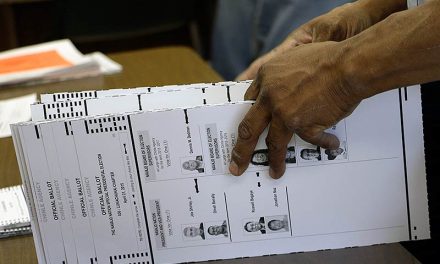
50 Years Ago | Due to Goldwater, Hopis favored to win land dispute
Leaders for both the Hopi and Navajo tribes spent most of this week in Washington, D.C., as the Senate Subcommittee on Indian Affairs were planning to hold a hearing on the century-old land dispute between the two tribes.
If this was a football game, the Hopis would be favored to win by 50 points. In other words, no one expected the Navajo delegation had a chance of getting the subcommittee members to consider the Navajo solution to the land dispute.
The reason was simple. Barry Goldwater, the senior senator from Arizona, has made it clear that he supports the Hopi position, which calls for the removal of Navajo families from half of the 1.8 million acres in dispute.
The Navajo proposal of paying the Hopis for their half doesn’t seem to have any supporters in Congress, given Goldwater’s support for the Hopi position.
Only a handful of the members of Congress have a good knowledge of the issues in this dispute. Other members view this as a local issue and, in those cases, they rely on the members who are from the area to look into the matter and come up with a solution so they don’t have to spend time researching it.
In 1972, Goldwater still had a lot of power in Congress and has steadfastly sided with the Hopis about gaining possession over half of the land. But in speeches on the reservation, he has also said repeatedly that approval of the Hopi position would not require the relocation of any Navajo family.
Even a Hopi Tribal Chairman Clarence Hamilton has said the Hopi plan calls for the removal of hundreds of Navajo families so it’s questionable if Goldwater understands what the Hopi position calls for. It’s also possible that Goldwater understands that Navajo families will have to be relocated and he is saying “no relocation” to keep support of the Navajo living on the disputed area.
Goldwater has also played up the fact that his family operated a trading post on the Navajo Reservation and he claims to have traveled over all of the reservation at one time or another.
Something no Navajo has done before
It seems that there isn’t a month that goes by that a member of the Navajo Tribe does something no Navajo has done before.
This month it was Todd Manygoats, a lumber grader since 1944. This month he was awarded a Master Lumber Grader certificate, which goes to anyone who has more than 20 years in the business.
John Hampton, president of the Wood Products Association, said Manygoats was being honored for his expertise in the field, but also for all the work he has done in mentoring young Navajos and encouraging them to go into the business.
He works for the Navajo Forest Products Industry, which also was recognized for its adherence to the highest principles of lumbering.
Demand for Hopi leader to step down
Speaking of The Hopi Tribe, traditional members this week made public a letter they had sent to Hopi Chairman Clarence Hamilton demanding that he step down as tribal chairman immediately.
If he doesn’t, the group said they would file a lawsuit to get him removed. Hamilton replied that he has no plans to resign and is thinking about running for another term.
It has been no secret that the traditionists on the reservation had been trying for more than a year to get Hamilton removed from office with no success.
About once a month, they had been sending press releases to the Times and Chet MacRorie, the Times’ managing editor, had played up the story because the traditionists supported the Navajo position in the land dispute.
In this latest attempt to get Hamilton removed, he was accused of not trying to resolve disputes between villages and for allowing mining companies to remove water for their use in their operations on the Navajo Reservation.
Whenever the Times published a story about the traditionalists, their opposition to the Hopi tribal government was always mentioned. In fact, their leaders stressed the fact they did not recognize the authority of the tribal government.
After more than two decades of complaining and getting no results, the group started filing their complaints with the United Nations. It got some national press but had no effect on the Hopi government.
The Hopi Tribal Council eventually issued their own press release dealing with the demand for Hamilton to resign. They pointed out that under tribal law, Hamilton represents all Hopis, even the traditionists regardless of how anyone feels.
And although the traditionalists refuse to have anything to do with the tribal government, Council leaders said they were welcome to come to any meeting and make known their feelings about legislation under consideration.
The Council agreed that there was a great divide between leaders of the tribe and leaders of the various villages but they promised to make an effort to try to work with traditional leaders.
At one of their press conferences, I asked why the group made no effort to gain control of the tribe though the voting booth. While they did not have enough votes to elect a member of their group – they were saying their group was 80 strong, if they voted in a block they may have the ability to elect one of the candidates.
If this happened, they would have political clout that would give them a say in government decisions.
Bu to do that, members of the group would have to recognize the authority of the tribal government, I was told, and that will never happen.








 Highway 264,
Highway 264, I-40, WB @ Winslow
I-40, WB @ Winslow